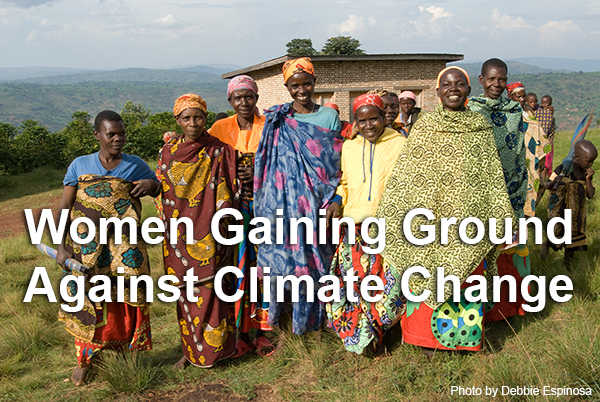Women Gaining Ground: Securing Land Rights as a Critical Pillar of Climate Change Strategy
As the bulk of the world’s poor and those who most rely on land and natural resources for their livelihood,
women are hardest hit by climate change. Research shows that women in the regions of the world most
affected by climate change, Africa and South Asia, bear the brunt of increased natural disasters, displacement,
unpredictable rain fall, decreased food production, and increased hunger and poverty.
women are hardest hit by climate change. Research shows that women in the regions of the world most
affected by climate change, Africa and South Asia, bear the brunt of increased natural disasters, displacement,
unpredictable rain fall, decreased food production, and increased hunger and poverty.
Women farmers are
particularly at risk. Their rights to access, use, control, and manage land are often diluted or denied. While
women are integrally involved in food production at every stage in every region of the world, they rarely
control the land that they till. Often women’s rights to land depend on relationship to male family members.
Laws and social norms often limit or ignore women’s land and property rights and routinely exclude women
from decision-making on land and natural resources.
Emerging evidence suggests that when women hold secure rights to land, efforts to tackle climate change are
more successful, and responsibilities and benefits associated with climate change response programs are
more equitably distributed. But very little research has addressed the three-way intersection of land tenure,
climate change, and women’s land rights. From both a sustainable development and a human rights
perspective, this nexus is crucially important.
Insecure land tenure for women may undermine efforts to mitigate climate change impacts. Without effective
legal control over the land they farm or the proceeds of their labor, women often lack the incentive, security,
opportunity, or authority to make decisions about ways to conserve the land and to ensure its long-term
productivity. Women in this situation know that if they work to irrigate their field or plant border trees, there is
a good chance that they will not be the ones to reap the benefits.
The stakes are high: while securing women’s land rights fosters critical gains, from enhanced social status, to
greater food security and better health and educational outcomes for families, neglecting to do so could have
significant negative effects on the wellbeing of women, children and entire communities.
Because these risks and benefits overlap with both mitigation practices and adaptation readiness, women’s
security of tenure, especially for smallholder farmers, must be included in ongoing climate change knowledge-generation,
decision-making processes, and interventions.
particularly at risk. Their rights to access, use, control, and manage land are often diluted or denied. While
women are integrally involved in food production at every stage in every region of the world, they rarely
control the land that they till. Often women’s rights to land depend on relationship to male family members.
Laws and social norms often limit or ignore women’s land and property rights and routinely exclude women
from decision-making on land and natural resources.
Emerging evidence suggests that when women hold secure rights to land, efforts to tackle climate change are
more successful, and responsibilities and benefits associated with climate change response programs are
more equitably distributed. But very little research has addressed the three-way intersection of land tenure,
climate change, and women’s land rights. From both a sustainable development and a human rights
perspective, this nexus is crucially important.
Insecure land tenure for women may undermine efforts to mitigate climate change impacts. Without effective
legal control over the land they farm or the proceeds of their labor, women often lack the incentive, security,
opportunity, or authority to make decisions about ways to conserve the land and to ensure its long-term
productivity. Women in this situation know that if they work to irrigate their field or plant border trees, there is
a good chance that they will not be the ones to reap the benefits.
The stakes are high: while securing women’s land rights fosters critical gains, from enhanced social status, to
greater food security and better health and educational outcomes for families, neglecting to do so could have
significant negative effects on the wellbeing of women, children and entire communities.
Because these risks and benefits overlap with both mitigation practices and adaptation readiness, women’s
security of tenure, especially for smallholder farmers, must be included in ongoing climate change knowledge-generation,
decision-making processes, and interventions.



